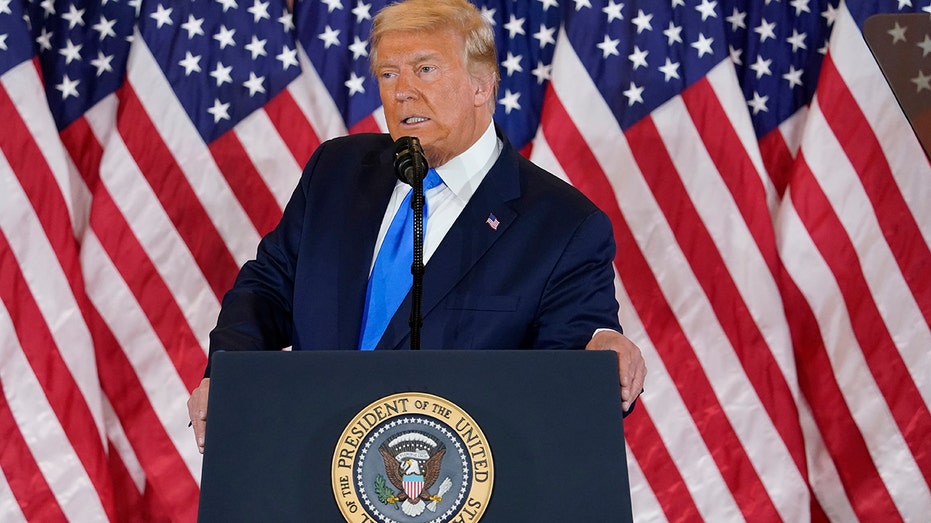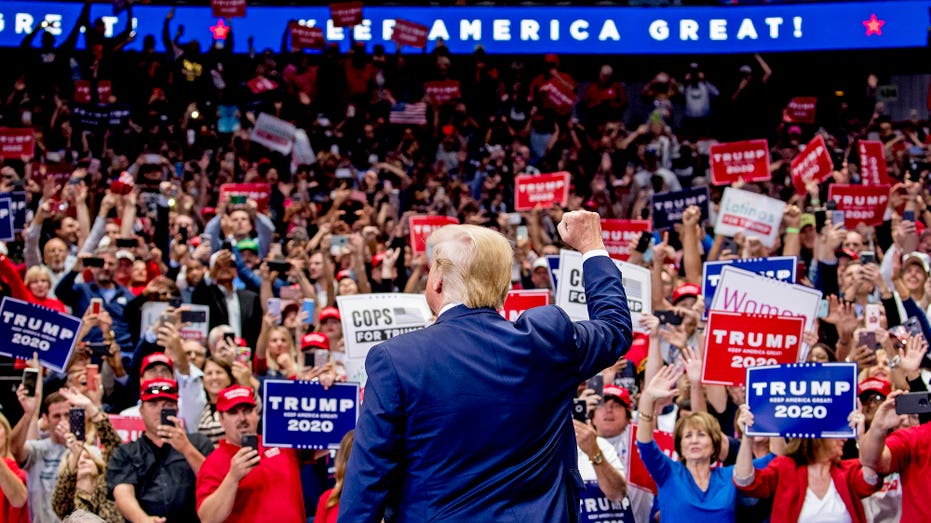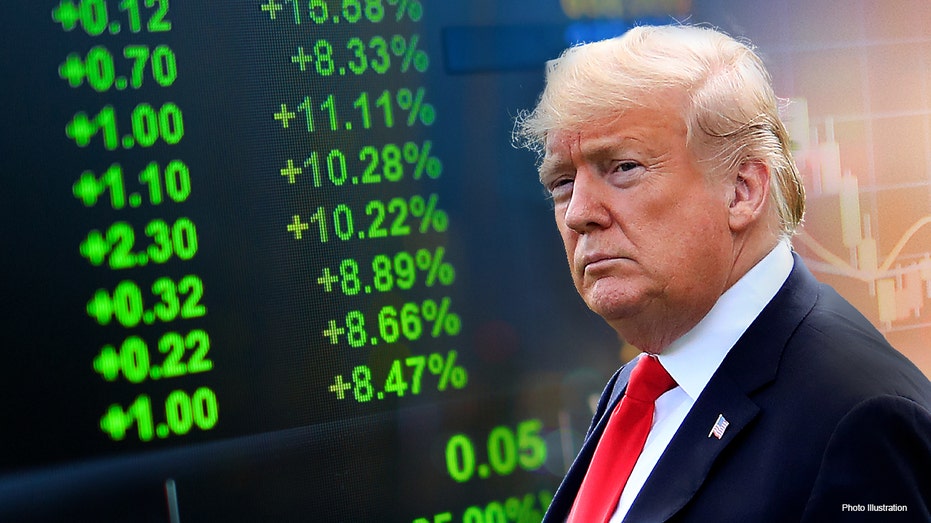Trump tax returns: Five notable facts
Trump tax returns show the former president did not collect Social Security
Releasing Trump's tax returns will result in 'even more leaking': Andrew McCarthy
Fox News contributor and former federal prosecutor Andrew McCarthy reacts to Congress releasing six years' worth of Donald Trump's tax returns.
While many questions remain over former President Trump's tax returns, some of the fine print is quite clear; including stock investments, cryptocurrency positions, Social Security benefits, and a few other surprises.
FOX Business takes a deep dive into the returns of the president and the former first lady Melania.
No Social Security

USA Social security cards laid on pile of dollar bills to illustrate money in retirement. Trump's tax return does not show receipt of Social Security benefits.
RECORD-HIGH SOCIAL SECURITY COST-OF-LIVING INCREASE POISED TO KICK IN SOON
The 76-year-old former president is not collecting Social Security, despite paying into the system via self-employment tax.
Americans can file for benefits when they turn 62. The payment increases every year you delay collecting until age 70, when the benefit payment maxes out.

President Donald Trump speaks in the East Room of the White House, early Wednesday, Nov. 4, 2020, in Washington. (AP Photo/Evan Vucci) ( )
To become benefit eligible, you need to work 10 years (40 quarters) at a job covered by the Social Security system, including self-employment, and earn at least $1,640 per quarter in 2023. The minimum earnings vary by year. It’s possible Trump may be ineligible for Social Security because much of his income has historically come from investing instead of "working."
In the two years before he became president (2015 and 2016), Trump earned $14,141 (2015) and $978 (2016) in W-2 income. Trump reported a net loss from personal businesses in 2015, meaning he did not pay self-employment tax that year, but he did pay self-employment social security and Medicare tax in 2016 when he earned $8.8 million from personal businesses.
Trump was president in 2017-2020. Social security and Medicare would have been withheld from his salary in those years.
IRS HIKING INTEREST RATES JAN. 1
$3 Presidential Election Campaign Fund

President Donald Trump takes the stage at a campaign rally at American Airlines Arena in Dallas, Texas, Thursday, Oct. 17, 2019. The Trumps checked boxes on their income tax returns to donate $3 to the Presidential Election Campaign Fund. (AP Photo/Andrew Harnik)
The Trumps checked the boxes to donate $3 each to the Presidential Election Campaign Fund even though he did not take any federal funds for his 2016 and 2020 campaigns.
Only 4.4% of taxpayers checked the box in 2016 and 3.56% in 2020.
The checkbox does not change on your refund or balance due. You won’t get an extra $3 by not checking the box, or lose $3 by checking it.
IRS UPDATES GUIDANCE ON 1099-KS: WHAT TO KNOW
Missed deadline

Copies of former President Donald Trump and former first lady Melania Trump individual tax returns for the year 2016, released by the Democratic-controlled House Ways and Means Committee, are photographed Friday, Dec. 30, 2022. (AP Photo/Jon Elswick / AP Images)
The Trumps missed the 2020 filing deadline completely and filed the previous five tax years at the last moment.
The 2015 return is dated October 17, 2016 — the last day to file under a federal tax extension. The Trumps did better next year. The 2016 return is dated Oct. 10, 2017, roughly a week before the due date.
The 2017 return is neither dated, nor signed, though it does include an extension payment, meaning the Trumps filed for an extension that year.
The 2018 and 2019 returns were filed days before the extended filing deadline.
A new accountant prepared the 2020 return and apparently missed the Oct. 15, 2021 extended filing due date. The return is dated Mar. 25, 2022.
The IRS accepts returns filed after the deadline. The service will not issue refunds for returns filed three years after original filing deadline.
The Trumps had a $13.5 million refund, meaning there were no late filing interest or penalties because there was no unpaid tax. The Trumps rolled over $8 million towards their 2021 taxes.
It’s not surprising the Trump’s returns are perpetually late. The returns contain dozens of Schedule K-1s from trusts, partnerships and S-corporations. These entities often file tax extensions themselves, virtually guaranteeing that the taxpayer receiving passthrough income will also have to file an extension.
FOR FTX CUSTOMERS, IRS PONZI RULES LOOM LARGE
No crypto

Various representations of cryptocurrency tokens and coins. The Trumps checked boxes on their tax returns stating they had no have virtual currency transactions during the respective tax years. (Chesnot/Getty Images / Getty Images)
The Trumps were involved in a wide variety of activities from aviation and acting to management services and modeling. However, they avoided crypto.
The IRS added a box in 2019 asking taxpayers whether they received, sold, exchanged or otherwise acquired any financial interest in any virtual currency during the year. The Trumps checked "No" in 2019 and 2020.
Almost 4% of taxpayers left both the "Yes" and "No" boxes blank in 2019. Just 1.4% (927,970) admitted to virtual currency activity.
The IRS moved the question to the first page of Form 1040 in 2020. Almost 3% of Americans left both boxes blank; 1.4% acknowledged virtual currency transactions.
WHERE TO INVEST YOUR MONEY IN 2023 AFTER ROUGH YEAR-END IN THE MARKETS
Blue chip investments

Trumps sold 7,000 shares of Apple for a $351,613 profit and 7,400 shares of Microsoft for a $215,691 gain. (Getty Images)
Donald Trump appears to be a conservative stock investor.
The Trumps’ tax returns show sales of Dow Jones Industrial Average members American Express, Apple, Caterpillar, Intel, McDonald’s, Microsoft and Proctor & Gamble. Other investment sales included U.S. Treasury notes, state municipal bonds, other stocks and mutual funds.
In 2017 the Trumps sold 7,000 shares of Apple for a $351,613 profit and 7,400 shares of Microsoft for a $215,691 gain.
| Ticker | Security | Last | Change | Change % |
|---|---|---|---|---|
| AAPL | APPLE INC. | 260.58 | -3.77 | -1.43% |
| MSFT | MICROSOFT CORP. | 398.46 | -1.14 | -0.29% |
CLICK HERE TO READ MORE FROM FOX BUSINESS
Trump's tax reform was 'rocket fuel' for the manufacturing economy: Jay Timmons
National Association of Manufacturers CEO Jay Timmons discusses how Washington lawmakers can help bring manufacturing back to America on 'The Claman Countdown.'






















